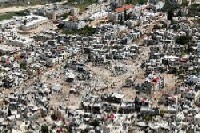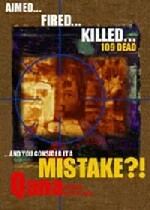
Pool/Reuters
I do not have to read Ariel Sharon’s autobiography, The Warrior or inquiries into the Sabra and Shatila massacre to remind me what Israel’s current Prime Minister is capable of doing to conclude that history repeats itself.
I could skim through recent yearbooks of Amnesty International, Human Rights Watch or the International Federation for Human Rights to see how history repeats itself.
What strikes me is the resemblance of inaction, passiveness, the reluctance to intervene on the part of European governments and other signatories to conventions that are supposed to protect and defend human rights and international humanitarian law.
But then again, looking back at recent history, one could see similar patterns. For example, let us have a look about the current politics around the UN fact-finding mission on recent events in the Jenin refugee camp. Asked repeatedly whether Israel would block the team from entering Jenin, Alan Baker, an official of Israel’s Foreign Ministry, said:
“I really can’t say. The prime minister and the foreign minister will meet to discuss this and give me instructions. Hopefully, we won’t have to deal with this question.”
This is not the first time there has been an inquiry or ‘fact-finding’, as diplomats prefer to term it, into possible Israeli violations of humanitarian law.

On April 18, 1996, approximately 800 civilians were sheltering here during a massive Israeli military offensive on Lebanon code-named Operation Grapes of Wrath. Most residents of Qana and neighboring villages had fled north a week earlier seeking refuge in Beirut. Those who remained behind had assumed they would be safe under United Nations’ protection.
In Van Kappen’s report to former UN Secretary General Boutros Boutros Ghali, van Kappen concluded that “while the possibility cannot be ruled out completely, it is unlikely that the shelling of the UNIFIL compound was the result of gross technical and/or procedural error,” as Israeli army officials had claimed. Van Kappen indicated that Israeli army officials of “some seniority” were involved in orders to fire upon the base, which they knew was sheltering hundreds of unarmed civilians.
The UN investigation noted that the Israeli army had positioned a drone (pilotless plane) over the FIJIBATT compound at the time of the shelling. Such aircraft are commonly used by Israeli gunners to set targets. International human rights organizations also conducted investigations into the Qana incident, and concluded that the shelling of the compound was most likely deliberate, not mistaken.
Middle East correspondent, Robert Fisk reported on April 19, 1996, in The Independent:
“It was a massacre. Not since Sabra and Chatila had I seen the innocent slaughtered like this. The Lebanese refugee women and children and men lay in heaps, their heads or arms or legs missing, beheaded or disemboweled. there were well over a hundred of them. A baby lay without a head. The Israeli shells had scythed through them as they lay in the United Nations shelter, believing that they were safe under the world’s protection. Like the Muslims of Srebrenica, the Muslims of Qana were wrong.”
The absence of precautions prior to the attack in close proximity to the town of Qana and the U.N. base located there, as well as the means and methods of attack chosen by the Israeli army (a sustained artillery barrage without lines of sight to the target), put Israel in violation of international humanitarian law.
At that time, it was The Clinton-administration gave the green light to Shimon Peres’ campaign against Southern Lebanon. The United States tried unsuccessfully to suppress the U.N. report blaming Israel for the massacre.
On April 25, 1996, the UN General Assembly adopted a resolution (A/RES/50/22 C), characterising Israel’s actions during the “Grapes of Wrath” offensive as “grave violations of international laws relating to the protection of civilians during war.” The United States and Israel vigorously contended that the attack had been an unfortunate mistake, and the story gradually disappeared from all but the memories of those civilians, UNIFIL personnel and journalists who had witnessed the carnage at Qana.
Amnesty International and Human Rights Watch also conducted investigations into the Qana incident, and concluded that the shelling of the compound was most likely deliberate, not mistaken.
First, the artillery was fired without the customary warnings issued by the Israeli army in advance of attacks near positions of U.N. peacekeepers. Second, the attack continued even after UNIFIL notified the Israeli military that the base was being shelled. Third, Israel’s claims that it had no knowledge that hundreds of civilians were sheltered at the Qana base are simply lies.
The decision of those who planned the attack to choose a mix of high-explosive artillery shells that included deadly anti-personnel shells designed to maximize injuries on the ground — and the sustained firing of such shells, without warning, in close proximity to a large concentration of civilians — violated a key principle of international humanitarian law.
Leading up to the Qana massacre, 17 villages had been flattened, over a half million people had been rendered homeless, more than 200 had been killed, and hundreds were wounded. Israeli Prime Minister Peres, who was granted the Nobel Prize for Peace, ordered the bombing blitz. The entire world, with the exception of the White House, condemned this attack conducted intentionally against civilians.
The tragedy at Qana was that this incident was not unique in its general features. More than twenty years ago, refugees at Sabra and Shatila woke up to one of the bloodiest chapters in Lebanon’s history.
In an age that has witnessed the international community’s growing intolerance of war crimes and the establishment of tribunals to indict and arrest war criminals in Rwanda and former Yugoslavia, it is jarring indeed to see the same acts happening over and over again.
In the spring of 1996, the US State Department and then-U.S. Ambassador to the United Nations, Madeleine Albright wanted the Secretary-General of the United Nations, Boutros Ghali to suppress the United Nations report, prepared by Dutch Maj. Gen. Franklin Van Kappen. In June 1996, the White House declared that it would wield its veto if necessary to prevent the re-election of Boutros-Ghali to a second term.
If we look again at the news today, as Israel has decided to suspend its cooperation with the United Nations fact-finding mission to Jenin refugee camp, we might see a similar pattern. Although this mission has been endorsed by the U.N. Security Council in resolution 1405, exactly six years after the Security Council adopted resolution 1052, deploring in particular the Qana incident on 18 April 1996, Israel delays the work of this team and complained that it was not consulted on the composition of the investigating team. This and Israel’s refusal to cooperate with the visit of the UN High Commissioner for Human Rights, Mary Robinson, flies in the face of the desire to find out the facts of what happened in Jenin. It seems more and more that Israel, indeed, has something to hide.
It is absolutely imperative that independent, investigative teams are able to gain access to the areas, including local and international human rights experts. Moreover, there have been investigative bodies in the past including in relation to the massacre in Sabra & Shatilla in 1982, Qibya in 1953, and it is crucial that for the widespread and systematic perpetration of war crimes and crimes against humanity to end and an ultimate lasting and just solution, that the fact finding body be seen as a first step alone. What is required is to establish the equivalent of the International Criminal Tribunal for former Yugoslavia and Rwanda to properly and fully investigate allegations of war crimes and to bring perpetrators to account.




